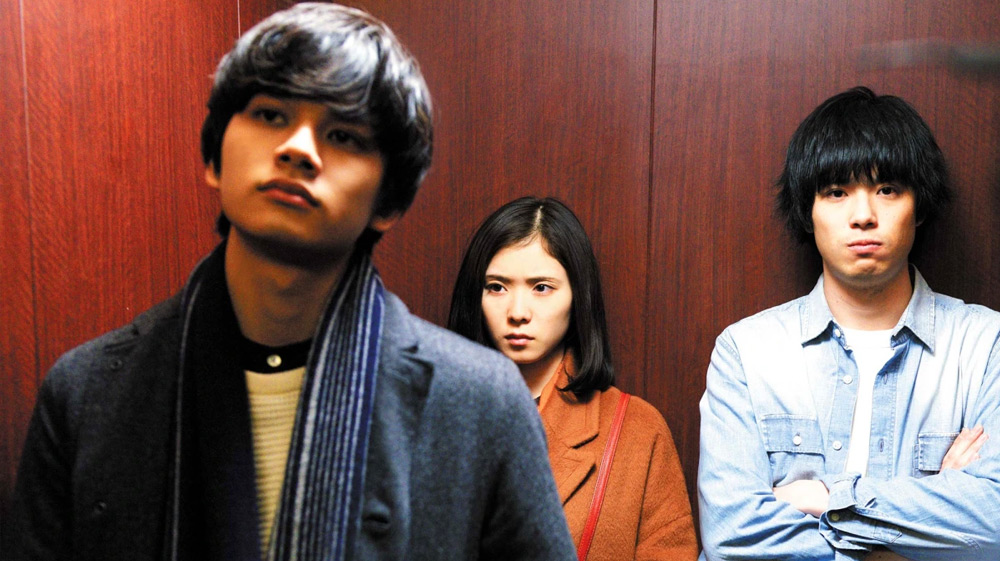Quarter-life crises gave the mumble its core in a prolific run of low-budget American indies that led off in 2002 with Andrew Bujalski’s Funny Ha Ha. While society has changed a lot since then—with the rise (and fall?) of social media and viral phenomena, the boom-bust-boom-bust cycles of tech and cubicle lyfe, and the arrival of an entire generation of digital natives making up new rules—the laws of attraction and the hellishness of mating rituals never really change much. Despite the permutations, that holds up across languages and nationalities.
Japan has fostered its own culturally specific epics of awkward, even catastrophic yearning and scrambled identity for what seems like decades now, perhaps epitomized in Sion Sono’s Love Exposure (2008), a fetish-driven, four-hour opus of desire shot through with upskirt photography, tortured Catholicism, teenage angst and cult madness—scored to the libidinal urgencies of Ravel’s “Bolero.”

Akiko Ohku’s 2017 feature Tremble All You Want isn’t remotely as far out, but it revels in oddball digressions and dream-like funk in a way that occurs so much less in mainstream American rom-coms, which rarely divert from the time-shackled rigors of extremely familiar plot mechanics. It also lays on the goofy charm thanks largely to its lead actress Mayu Matsuoka (Shoplifters). She plays Yoshika, a 24-year-old woman who has taken an accounting gig in a corporate office but compensates for her Dilbert-like work conditions with a rich—perhaps overly so—fantasy life. The story, adapted from a 2010 bestselling novel by Risa Wataya, presents Yoshika as haplessly stuck in a lovelorn limbo. She is pursued by an officemate, Kirishima (Daichi Watanabe), who has the enthusiasm of a floppy-eared dog and is equally as clumsy, asking her to be his girlfriend… after he pukes on the street, a bad reaction to their first drinks together. Since high school, Yoshika has harbored a crush on Ichi (Takumi Kitamura), who she called the “One,” and who stars in all her romantic fantasies. Whipping up a plot to find him, even though they never spoke, she concocts a fake social-media identity and initiates a class reunion. The gathering proves something of a disaster for her, yet Yoshika manages to arrange another get-together in Tokyo that will include Ichi, still a heartthrob but one who recalls his teenage popularity differently than everyone else. They connect over their shared passion for fossils and extinct animals—Yoshika notably obsesses over ancient ammonite she acquired—but the vibe is dimmed by Ichi’s self-absorption. Antics, confusion and disappointments ensue, as Yoshika takes a rocky, self-sabotaging path towards maybe one day losing her virginity.

Tremble All You Want, which is available to stream for free this month, joins the Fandor library along with Ohku’s Hold Me Back (2020), likewise a rom-com of cumbrous self-realization, and Fantastic Girls (2015), a manga-themed class-reunion drama. The 2017 film fits right in with the director’s female-centered themes of love, friendship and self-discovery, an 11-feature oeuvre that began with 2007’s Koisuru madori (“Floor Plan”).
The filmmaker shows a manic flair in Tremble, ever willing to disrupt expectations and uncork surreal reveries whenever the mood strikes: whether slipping into musical mode as Yoshika breaks into song in her favorite burger joint (whose cute, white-haired waitress is something of a fixation), or freely sliding into a high-school flashback. Yoshika is the kind of character who talks to herself constantly, narrating her own story and its possible variations, and can successfully invite disaster by nearly burning down her tiny studio apartment or quitting her job under dramatic false pretenses in order to own her would-be office suitor. Matsuoka nimbly steps through an earthquake of tonal shifts and narrative ruptures, and somehow keeps the narrative tethered to her mercurial heroine, who remains both sympathetic and full of surprises.




